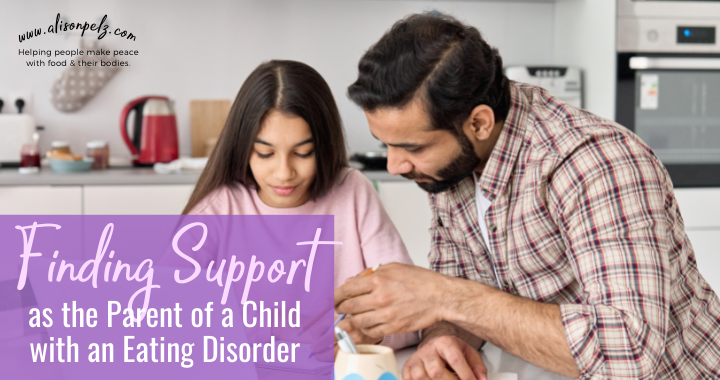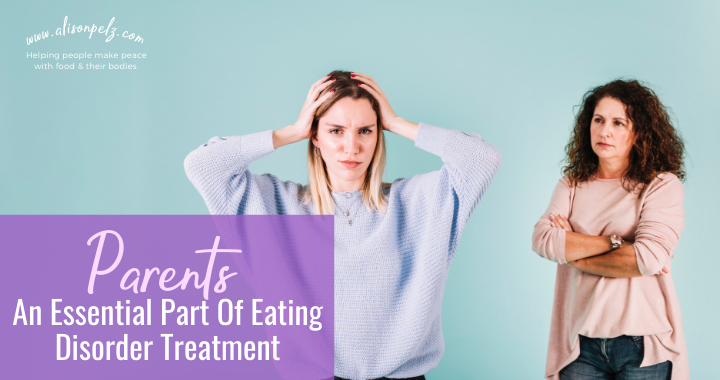It’s not easy to be a parent or caregiver for someone who is struggling with an eating disorder, at any age.
Parenthood is often described as having your heart walk around outside of your body, so watching your child struggle with such a complicated disorder can be heartbreaking. It’s scary to feel like your child needs help beyond what you can give.
Eating disorders don’t go away without being treated. It is essential for your child to begin treatment for their eating disorder so they can get relief from the distress they are feeling.
As a parent or caregiver, you are an important pillar of support for your child as they go through eating disorder recovery.
Eating disorders are complicated, and we often don’t learn much about them until someone we know is dealing with one. Much of the ‘common knowledge’ out there about eating disorders are actually myths, like that eating disorders only affect teen girls or that they’re not that serious. Eating disorders don’t discriminate by age or gender- anyone can develop an eating disorder. In fact, a common risk factor for developing an eating disorder is a history of dieting.
As the caregiver of someone with an eating disorder, you naturally want to do what you can to help your child through this. Learning more about eating disorders can help you understand what your child is going through, and connecting with other caregivers can give you an opportunity to feel supported yourself. You don’t have to go through this alone.
Here are some resources for caregivers of children with eating disorders:
Eating Disorder Books For Caregivers:
The following books give practical strategies for families supporting their loved one with an eating disorder. They are all using a family-based treatment (FBT) approach to treating an eating disorder.
Family-based treatment empowers the family to help support their child through nutritonal rehabilitation and eating disorder behaviors.
- Skills-based Learning for Caring for a Loved One with an Eating Disorder by Janet Treasure, Grainne Smith, and Anna Crane.
- When Your Teen Has an Eating Disorder: Practical Strategies to Help Your Teen Recover from Anorexia, Bulimia, and Binge Eating by Lauren Muhlheim PsyD and Laura Collins Lyster-Mensh
- Help Your Teenager Beat an Eating Disorder by James Lock and Daniel LaGrange.
Support Groups + Other Resources for Caregivers
Here are a list of support groups for caregivers. Many families find it helpful to learn that they are not alone in their struggle.
- Family & Caregiver Support Group: Child & Adolescent Patients – Offered on Wednesday Evenings at 4 and 6:15 pm MDT
- Family & Caregiver Support Group: Adult Patients – Offered on Thursday Evenings at 6 and 7:30 pm MDT
- “Join fellow caregivers and family members for a weekly Internet Support Group offering support, education about eating disorders, and connection with other individuals with shared experiences. Participation in the group is online, free, and open to anyone supporting someone with an eating disorder.”
- Center For Discovery Support Group for Loved Ones of Individuals in Eating Disorder Recovery
- This group is open to family and friends of a loved one who is in eating disorder treatment, in recovery, or who has not yet sought treatment for an eating disorder. Offered on the 2nd and 4th Wednesday of each month from 7-8 pm CST.
FEAST Resources
Families Empowered and Supporting Treatment for Eating Disorders (Feast) is a non-profit that supports caregivers and loved ones with eating disorders. FEAST provides free support to caregivers around the world:
- FEAST’s First 30 Days Educational Service
-
- Information delivered right to your inbox on how to care for your loved one.
- “We want to change the course of a family’s caregiving journey in 30 days. These 30 days of lessons are meant to start the family on a new course of empowerment and good information. Over the 30 days you will learn about eating disorders, caregiving, and the resources available for ongoing learning. We will introduce you to the resources and the peer support of our worldwide community.
- Forums to get support from other caregivers
- “This is a free service provided for parents of those suffering from eating disorders. It is moderated by kind, experienced, parent caregivers trained to guide you in how to use the forum and how to find resources to help you support your family member. This forum is for parents of patients with all eating disorder diagnoses, all ages, around the world.”
- Webinar Series that frequently feature leading researchers and experienced clinicians in the field.
- FEAST’s Parents Do Not Cause Eating Disorders Info Page
-
- This statement may seem obvious, but it is the sad history of eating disorder treatment that parents are sometimes still blamed or feel blamed when a loved one develops an eating disorder. For those families suffering from guilt, from feeling blamed, or unsure of who to believe on this topic, here are some things to keep in mind.”
-
Are you looking for more ways to support your child as they recover from their eating disorder? Working with a treatment team is the gold-standard for eating disorder recovery, as eating disorders impact health in many ways, from physical to mental health.

